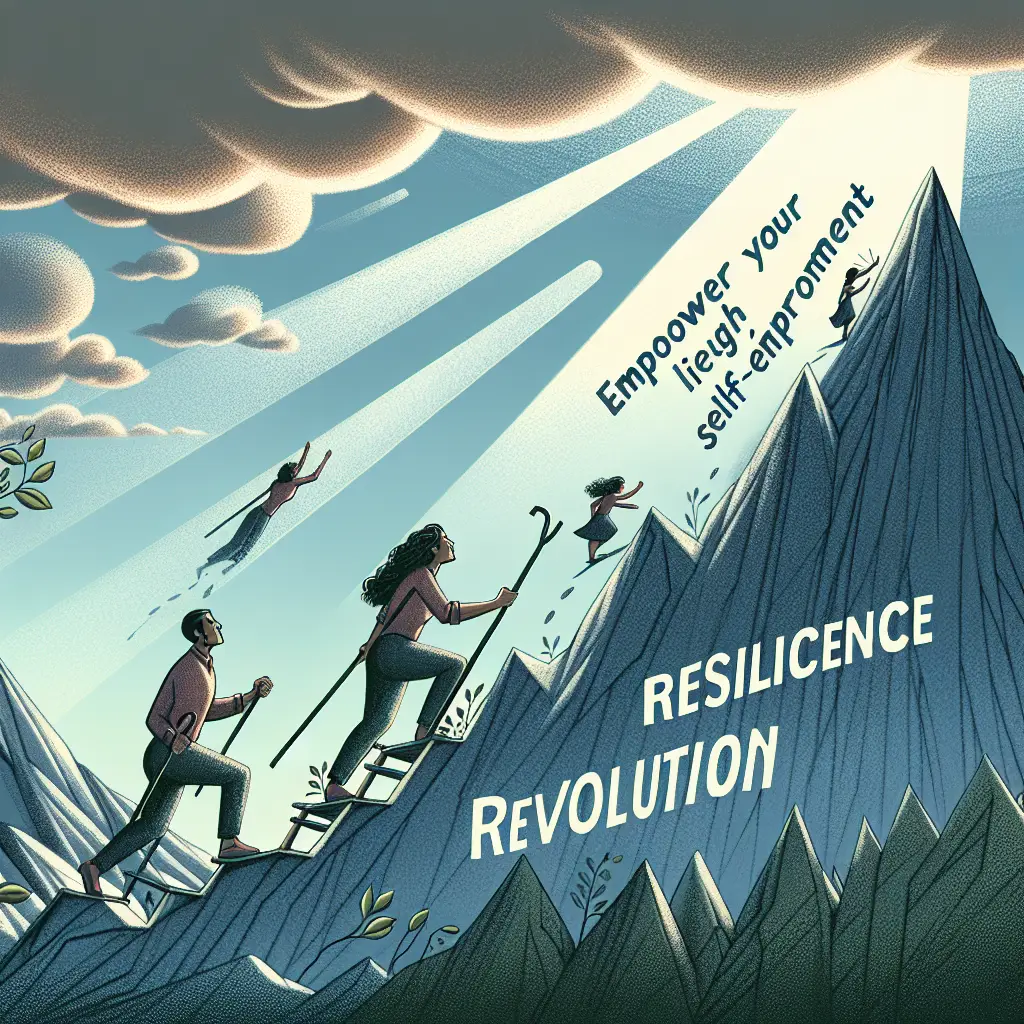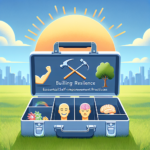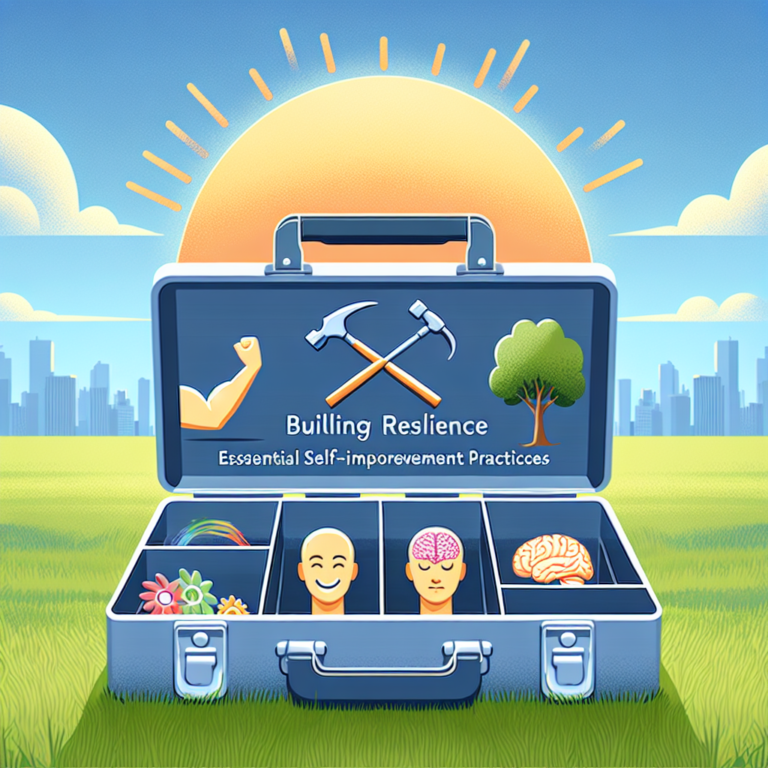
Resilience Revolution: Empower Your Life Through Self-Improvement for Ultimate Growth
Introduction
In an ever-changing world marked by unpredictability and challenges, the theme of resilience has become more essential than ever before. The term “Resilience Revolution: Empower Your Life Through Self-Improvement” encapsulates a profound truth: that each of us has the ability to harness our inner strength and adaptability to rise above life’s adversities.
Imagine your life transformed, where setbacks turn into stepping stones and obstacles morph into opportunities. This journey is not just a distant dream; it’s a revolution waiting to happen within you. Resilience is not merely about bouncing back but evolving into a better version of yourself.
In this article, we will explore how you can embark on this resilience revolution, equipping you with robust self-improvement strategies that empower your life. Together, we will dive into case studies, analyze real-world applications, and uncover practical tips that will guide you on this transformative journey.
Understanding Resilience
The Essence of Resilience
Resilience is the ability to adapt and thrive in the face of adversity. It’s what helps us recover from challenges like losing a job, facing illness, or dealing with personal loss. More than just strength, resilience intertwines emotional regulation, problem-solving skills, and a positive mindset.
Think about a stormy sea. A resilient ship does not merely withstand waves; it learns to navigate through turbulent waters effectively. This same principle applies to our lives; cultivating resilience means developing tools and strategies that allow us to sail smoothly through life’s storms.
The Science Behind Resilience
Research indicates that resilience can be nurtured and developed over time. Psychologists identify key traits of resilient individuals, including optimism, emotional regulation, and strong social connections. By understanding these elements, we can implement targeted self-improvement techniques to enhance our resilience.
- Optimism: Viewing challenges as temporary and surmountable fosters resilience.
- Emotional Regulation: Managing our emotions during difficult times prevents us from becoming overwhelmed.
- Social Connection: Building a supportive network allows us to share struggles, reducing feelings of isolation.
Case Study: The Resilience of J.K. Rowling
A prime example of resilience is J.K. Rowling, author of the beloved "Harry Potter" series. Before her fame, she faced numerous challenges, including unemployment, divorce, and raising her daughter as a single parent. Instead of succumbing to despair, Rowling used her struggles as fuel for her creativity.
Her determination to finish and publish her book, despite numerous rejections, is a testament to the power of resilience. Today, her story inspires millions, exemplifying that adversity can lead to extraordinary achievements.
Embarking on Your Resilience Revolution
1. Cultivating a Growth Mindset
A growth mindset enables us to view challenges as opportunities for development. Instead of fearing failure, embrace it; every misstep is a lesson that propels you forward.
Key Actions:
- Reflect on Past Experiences: Identify lessons learned from previous challenges.
- Challenge Negative Thoughts: Replace self-doubt with empowering affirmations.
2. Setting SMART Goals
Setting goals using the SMART framework (Specific, Measurable, Achievable, Relevant, Time-bound) will position you for success in your self-improvement journey.
Example Table of SMART Goals:
| Goal Area | Specific | Measurable | Achievable | Relevant | Time-bound |
|---|---|---|---|---|---|
| Health | Exercise 3 times a week | Track workouts | 30 minutes each session | Improve physical fitness | 3 months |
| Career | Complete a professional course | Course certificate | Online format | Career advancement | 6 months |
| Personal Growth | Read 2 self-help books per month | Monthly log | 1 hour/week | Increase knowledge | 1 year |
3. Building Emotional Intelligence
Emotional intelligence (EI) plays a pivotal role in resilience. It involves recognizing, understanding, and managing our emotions as well as being empathic toward others.
Key Strategies:
- Self-Reflection: Daily journaling can enhance your EI by encouraging reflection on your emotions and reactions.
- Mindfulness Practices: Meditation and breathing exercises help you stay grounded during stress.
4. Reinforcing Connections
Establishing strong relationships with family, friends, and colleagues is paramount. A supportive network can help cushion the blow of life’s uncertainties.
Key Actions:
- Invest Time in Relationships: Schedule regular catch-ups with loved ones.
- Join Support Groups: Find communities that align with your values and challenges.
Case Study: The Power of Community Support
Consider the story of a group of cancer survivors who formed a support group. By sharing their fears, triumphs, and hopes, they empowered each other to face illness with a positive outlook. The camaraderie they developed significantly improved their mental health and resilience against the disease.
Tools for Your Resilience Toolkit
1. Journaling for Reflection
Journaling not only promotes self-awareness but also acts as a stress-relief tool. Writing about your feelings and thoughts can help make sense of emotional turmoil.
2. Creative Visualization Techniques
Imagining yourself overcoming obstacles can reinforce your belief in your ability to manage difficult situations.
3. Learning Stress Management Techniques
Understanding and implementing stress management strategies like deep breathing, progressive muscle relaxation, or yoga can effectively boost your resilience.
4. Seeking Professional Help
Sometimes the best way to develop resilience is to seek guidance from a counselor or therapist. Professional support can provide personalized strategies that align with your unique circumstances.
Measuring Progress on Your Resilience Journey
It’s vital to monitor your progress as you engage in this resilience revolution. Regular self-assessment can help you stay accountable and recognize growth over time.
Key Metrics to Track:
- Emotional Well-Being: Use a mood tracker to monitor your emotional fluctuations.
- Goal Completion: Review your SMART goals every month to assess accomplishment and make necessary adjustments.
- Social Engagement: Keep a log of interactions with friends and family to ensure you’re nurturing your connections.
Case Study: The Corporate Resilience Program
A corporate initiative aimed at enhancing employee resilience by providing workshops and holistic wellness programs resulted in a 30% improvement in employee satisfaction and a 20% decrease in turnover. Companies like these highlight the importance of investing in resilience at both personal and organizational levels.
Conclusion
The "Resilience Revolution: Empower Your Life Through Self-Improvement" is not just a theory; it is a life-altering journey that beckons every individual to embrace their innate strength and potential. By cultivating resilience through the strategies we’ve explored, you’re not only preparing to face life’s challenges—you’re empowering yourself to flourish amidst them.
Every step taken toward greater resilience enhances your emotional and mental well-being, shaping you into a person who can navigate life’s uncertainties with confidence and grace. The power to transform your life lies within you; let this resilience revolution begin today!
FAQs
1. What is resilience in simple terms?
Resilience refers to our capacity to recover from difficulties and adapt to change, enabling us to face life’s challenges more effectively.
2. Can resilience be developed?
Yes, resilience is not an inherent trait; it can be cultivated through various self-improvement strategies and practices.
3. How can I measure my resilience?
You can measure your resilience by reflecting on how you manage stress, cope with challenges, and the quality of your support networks.
4. What if I feel overwhelmed despite trying to be resilient?
Feeling overwhelmed is normal. It’s important to seek professional help, as they can provide personalized strategies to enhance your resilience.
5. How do I start my journey toward greater resilience?
Start by cultivating a growth mindset, setting SMART goals, and actively building supportive relationships. Engage in self-reflection and seek continuous growth opportunities.
Harness the “Resilience Revolution: Empower Your Life Through Self-Improvement” and witness the transformation not only in your life but also in how you approach challenges. The journey is yours—embrace it!

















